|
|
|
Sort Order |
|
|
|
Items / Page
|
|
|
|
|
|
|
| Srl | Item |
| 1 |
ID:
132793
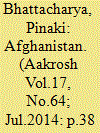

|
|
|
|
|
| Publication |
2014.
|
| Summary/Abstract |
General Boris Gromov, commander of the 40th Army of the Soviet Union, crossed the 'Friendship' bridge linking the Salang Pass on 15 February I989. hack to the motherland. Najibullah. the Afghan president and a Communist protege' of the USSR regime of Mikhail Gorbachev, was ousted from power in April 1992. The intervening three years have a story to tell to the various protagonists of the current Afghan drama being enacted right now as another superpower gets ready to decamp without completing what it set out to do. The Red Army had left in early I989, and its nominee, Najihullah. held on to power for another three years on the strength of the same Afghan army that had desertions, remained fragmented in factional lines - the Parchams and the Khalqis - and was depleted in terms of resources.
|
|
|
|
|
|
|
|
|
|
|
|
|
|
|
|
| 2 |
ID:
132344
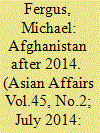

|
|
|
|
|
| Publication |
2014.
|
| Summary/Abstract |
A number of the NGOs now working in Afghanistan, like Oxfam, Afghan Aid and the Agha Khan Foundation have been there for many years and show no sign of planning to leave when NATO troops withdraw. This article is written by a committee member of the Norwegian Afghanistan Committee, which was formally established in Bergen in 1980, as a political reaction to the Soviet invasion. In 1983, the Committee started sending health workers into unoccupied areas of the country and their activities have continued ever since, though the Soviets left nearly a quarter of a century ago. The goodwill and contacts built up over time by the Committee and other NGOs have been important in validating their presence, their activities and their motives. To be useful in Afghanistan needs a commitment to the long haul.
|
|
|
|
|
|
|
|
|
|
|
|
|
|
|
|
| 3 |
ID:
128387
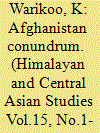

|
|
|
|
|
| Publication |
2011.
|
| Summary/Abstract |
Located at the crossroads of Central, South and West Asia and sharing. its borders with Central Asian Republics of Tajikistan, Uzbekistan and Turkmenistan on the north, Chinese province of Xinjiang in the east, [ran on the west and south west, and Pakistan and Pak-occu pied Kashmir on the south and south east, Afghanistan occupies a unique geo-strategic placement in the region. Distinct ethno-linguistic groups settled in different parts of .»'\fghanistan have diverse social moorings and political affiliations and aspirations. Th us the 'I'ajil
|
|
|
|
|
|
|
|
|
|
|
|
|
|
|
|
| 4 |
ID:
128435
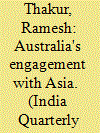

|
|
|
|
|
| Publication |
2013.
|
| Summary/Abstract |
The ebb and flow of coping with Australia's identity dilemma as a European settler society located on the geographical edge of Asia leads to bouts of agonising, excitement and temporising. This has been given particular cogency with the power shift underway from the trans-Atlantic to the Asia-Pacific. The 2012 White Paper set 25 national objectives to be met by 2025, with targets ranging from improving trade links and increasing scholarships to teaching priority Asian languages. But in this transactional embrace of Asia that highlights economic and trade links, gaps might open up between ambition and delivery, especially amidst continuing evidence of insensitivity to how Asians forge lasting relationships. Ties with China are dominated by trade but security concerns remain. Relations with India should improve with the removal of the nuclear issue as an irritant and growing trade and tourist numbers. Japan remains an important trade and diplomatic partner. And geography and demography ensure that Indonesia is no less important to Australia than Asia's big three.
|
|
|
|
|
|
|
|
|
|
|
|
|
|
|
|
| 5 |
ID:
132479
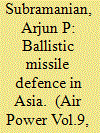

|
|
|
|
|
| Publication |
2014.
|
| Summary/Abstract |
The one continent where ballistic missiles have proliferated tremendously is Asia. There are some important factors that have been, and are, contributing to such a trend in the region. Firstly, the demand for the ballistic missile as it is a relatively cheap weapon to develop and deploy compared to a large and sophisticated air force. Also, this weapon is hard to counter even by the most technologically advanced countries. Secondly, the existing geo- political make-up where confrontation is between states that are at opposite poles of the power spectrum, where the weaker side finds such weapons most suitable to counter a technologically superior adversary. Thirdly, the ready availability of the technology and vital components through both legal and clandestine means. These factors have enabled states like North
Korea with a less than meagre technology base to adapt the technology, of course, with tremendous assistance, to develop ballistic missile capability. With the rapid proliferation of these weapons in Asia, countries facing this threat have been looking for ways to counter it. Most have turned to some level of Ballistic Missile Defence (BMD). This paper attempts to study the ballistic missile threat and the missile defence efforts of the US and its allies in East Asia, China, Israel and India.
|
|
|
|
|
|
|
|
|
|
|
|
|
|
|
|
| 6 |
ID:
133547
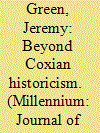

|
|
|
|
|
| Publication |
2014.
|
| Summary/Abstract |
This article scrutinises Robert Cox's theorisation of 19th century world order, proposing 'uneven and combined development' as an alternative conceptual approach. I contend that Cox's understanding of 19th century world order is insufficient as it neglects the significance of German ascendance. Privileging hegemonic construction of world order, Cox's account of the decomposition of Pax Britannica reifies the neo-realist anarchy problematique. Overall, Cox exaggerates the degree of rupture between phases of world order, obscuring developmental continuities that produce different 'geopolitical' contexts. Uneven and combined development, I propose, enables a fruitful reappraisal of the period. Process-based international historical sociology is suggested as an alternative way to think about 19th century world order and critical IR.
|
|
|
|
|
|
|
|
|
|
|
|
|
|
|
|
| 7 |
ID:
129527
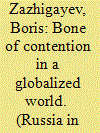

|
|
|
|
|
| Publication |
2014.
|
| Summary/Abstract |
In the context of the twenty-first-century globalized world, Ukraine is destined to play a pivotal role as the junction of civilizations, precisely in the same manner the country did numerous times in the past. Such a role largely determines Ukraine's geopolitical status as a buffer territory, in which conflicts play out between branches of Christianity and European and Asian cultures. In the twenty-first century, controlling Ukrainian territory has become extremely critical. In contrast to past events, this control has acquired a new and far greater geopolitical significance.
|
|
|
|
|
|
|
|
|
|
|
|
|
|
|
|
| 8 |
ID:
133666
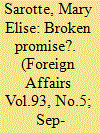

|
|
|
|
|
| Publication |
2014.
|
| Summary/Abstract |
Moscow has long argued that in expanding NATO eastward, Washington broke the promise it made to Soviet leaders shortly after the Berlin wall fell. But new evidence shows that the United States never actually made such a pledge.
|
|
|
|
|
|
|
|
|
|
|
|
|
|
|
|
| 9 |
ID:
134116
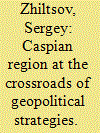

|
|
|
|
|
| Publication |
2014.
|
| Summary/Abstract |
The author concentrates on the geopolitical games in the Caspian region and identifies the factors that have remained prominent in the last twenty years and, in fact, determined the developments in this part of the world, viz. oil and gas reserves, the scope of their industrial production, and the recently built export pipelines as geopolitical instruments of the Caspian states and extra-regional players.
He analyzes the geopolitical aims of Russia, the European Union, the U.S., and China, the key players responsible for the Caspian geopolitical context, to conclude that the region's geopolitical, social, economic, and political future, as well as its interstate relations largely depend on the pace at which oil and gas is produced and pipeline projects implemented
|
|
|
|
|
|
|
|
|
|
|
|
|
|
|
|
| 10 |
ID:
128117
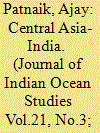

|
|
|
|
|
| Publication |
2013.
|
| Summary/Abstract |
Revival of the 'Silk Road' or Silk Road Strategy is a fashionable terms now days, even in Indian academic circles. Of course the word has been used more extensively by American and Chinese scholars. This began with the US Silk Road Strategy act of 1999, which talked of transporting the Central Asian region's natural resources to the international market.
|
|
|
|
|
|
|
|
|
|
|
|
|
|
|
|
| 11 |
ID:
131594
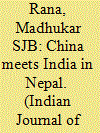

|
|
|
|
|
| Publication |
2013.
|
| Summary/Abstract |
This article attempts to conduct a comprehensive assessment of India and China's interests in Nepal in the wake of the drastic political Nepal since 2006. In this regard, the '6C- Frame of 1 as been employed in the context of Nepal, viz, 1) What are : interests of China and India?; it) What are their conflicting I) What are the areas of cooperation," (iv) What are the areas ' v) How do they diplomatically communicate their T vi) How do they diplomatically coordinate their interests cooperation and minimize con?ict?
|
|
|
|
|
|
|
|
|
|
|
|
|
|
|
|
| 12 |
ID:
132020
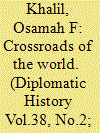

|
|
|
|
|
| Publication |
2014.
|
| Summary/Abstract |
In this paper, I argue that the "Middle East" is an ideational construct maintained by geographical, intellectual, and ideological representations. I assert that the geographical boundaries of the area called the Middle East have shifted over the past century to reflect the strategic interests of the major hegemonic power in the region, initially Britain and later the United States. Drawing on published and archival sources, I trace the etymology of the "Middle East" and its accompanying geographical representations and their relationship to key American and British foreign policy decisions and declarations. I also discuss how the Arabic translation of the "Middle East," or al-Sharq al-Awsa?, has been adopted and contested by scholars and journalists in the region.
|
|
|
|
|
|
|
|
|
|
|
|
|
|
|
|
| 13 |
ID:
128027
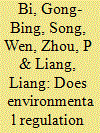

|
|
|
|
|
| Publication |
2014.
|
| Summary/Abstract |
Data envelopment analysis (DEA) has gained much popularity in performance measurement of power industry. This paper presents a slack-based measure approach to investigating the relationship between fossil fuel consumption and the environmental regulation of China's thermal power generation. We first calculate the total-factor energy efficiency without considering environmental constraints. An environmental performance indicator is proposed through decomposing the total-factor energy efficiency. The proposed approach is then employed to examine whether environmental regulation affects the energy efficiency of China's thermal power generation. We find that the environmental efficiency plays a significant role in affecting energy performance of China's thermal generation sector. Decreasing the discharge of major pollutants can improve both energy performance and environmental efficiency. Besides, we also have three main findings: (1) The energy efficiency and environmental efficiency were relatively low. (2) The energy and environmental efficiency scores show great variations among provinces. (3) Both energy efficiency and environmental efficiency are of obvious geographical characteristics. According to our findings, we suggest some policy implications.
|
|
|
|
|
|
|
|
|
|
|
|
|
|
|
|
| 14 |
ID:
133778
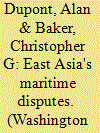

|
|
|
|
|
| Publication |
2014.
|
| Summary/Abstract |
Few doubt that China's rise is this era's principal driver of strategic change, just as the United States' equally influential ascendancy shaped the last. But earlier optimism that the Middle Kingdom's re-emergence as a major power would be largely benign is fading as evidence mounts that Beijing is determined to press its territorial and resource claims in the vitally important seas of the Western Pacific. In barely the blink of a geopolitical eye, China's once lauded charm offensive has given way to exactly the kind of coercive behavior its critics have long predicted.1 In a 3,000-mile maritime arc running from the East China Sea to the southern reaches of the South China Sea, Beijing is at loggerheads with many of its neighbors, including erstwhile friends, over several linked territorial and resource disputes. If not wisely managed, these disputes could bring East Asia's long peace to a premature and bloody end.
|
|
|
|
|
|
|
|
|
|
|
|
|
|
|
|
| 15 |
ID:
131511
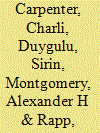

|
|
|
|
|
| Publication |
2014.
|
| Summary/Abstract |
Through a series of focus groups with human security practitioners, we examined how powerful organizations at the center of advocacy networks select issues for attention. Participants emphasized five sets of factors: entrepreneur attributes, adopter attributes, the broader political context, issue attributes, and intranetwork relations. However, the last two were much more consistently invoked by practitioners in their evaluations of specific candidate issues. Scholars of global agenda setting should pay particular attention to how intranetwork relations structure gatekeeper preferences within transnational advocacy spaces because these help constitute perceptions of issues' and actors' attributes in networks.
|
|
|
|
|
|
|
|
|
|
|
|
|
|
|
|
| 16 |
ID:
132015
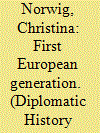

|
|
|
|
|
| Publication |
2014.
|
| Summary/Abstract |
This article explores the central role of youth in the process of European integration. Analyzing the sources of the European Youth Campaign, an international program implemented by the European Movement in the fifties, it focuses on the symbol of youth in discourse on European integration, as well as on the historical agency of young people. After World War II, Europeans conceptualized a future united Europe in terms of "youthfulness" to distinguish the new era from the continent's violent past. Young people also referred to the traditional "myth of youth" in their statements and actions. By staging themselves as a "first European generation," they staked claims to agency in the process of building a new united Europe. Various examples of youth projects reveal the actual role of young people as historical agents and show how the politics of European integration and the Cold War played out at a grass-roots level. With their participation, young people not only helped to constitute the prevailing power constellations; they also challenged them.
|
|
|
|
|
|
|
|
|
|
|
|
|
|
|
|
| 17 |
ID:
129682
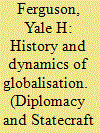

|
|
|
|
|
| Publication |
2014.
|
| Summary/Abstract |
Globalisation involves geographically wider transaction networks and has multiple interrelated dimensions. The globalisation process has geographical scope, volume and density of transactions, and a direction and pace of change. Globalization has a long history, and the local and the global have almost continuously interacted. Most forward changes have been incremental, and there have also been major reversals or almost complete system-breakdowns. There are numerous drivers of globalization of different types, persons, and groups with varying motives, and anonymous drivers like technology, weather, and disease. The article devotes most attention to a review of selected patterns and trends in contemporary globalisation These are climate change; demographic trends, income inequality, and migration; security concerns, technology, and peacekeeping; competing ideologies; the global economy, equities, trade, banking reform, and tax havens; and shifting power relationships among the United States, Europe, China, Japan, and Emerging Markets.
|
|
|
|
|
|
|
|
|
|
|
|
|
|
|
|
| 18 |
ID:
127034
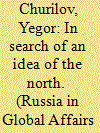

|
|
|
|
|
| Publication |
2013.
|
| Summary/Abstract |
The Republic of Belarus emerged as a sovereign political entity on the world political map more than twenty years ago. The breakup of the Soviet Union made it possible for the constituent republics to acquire an independent status, and for the COMECON and Warsaw Pact countries, shrug off Soviet protectorate. In contrast to most of these states, Belarus has built its own economic and political model and retained a truly independent political stance, even though it has found itself sandwiched between geopolitical giants in the West and in the East. Belarus as a state in its own right is an established fact of history that has to be taken into account by its European neighbors and overseas strategists who seek to use its special place and role to their own advantage.
|
|
|
|
|
|
|
|
|
|
|
|
|
|
|
|
| 19 |
ID:
125477
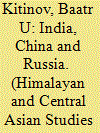

|
|
|
|
|
| Publication |
2013.
|
| Summary/Abstract |
At present the direction and content of civilization process is characterized by a significant updating of religious sentiment, which suggests a single confessional-civilizational discourse. Such discourses may have special capabilities to optimize and diversify approaches to forecasting and planning of political process, depending on various regional characteristics.
|
|
|
|
|
|
|
|
|
|
|
|
|
|
|
|
| 20 |
ID:
125496
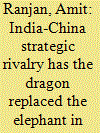

|
|
|
|
|
| Publication |
2013.
|
| Summary/Abstract |
Has China replaced or is an the process of "replacing" strategic presence of India in South Asia, is the most pertinent question, which keeps the Indian strategic community busy. It is known fact that since ancient time South Asia, as a region, had been under the influence of India; but things change since beginning of the Cold War.
|
|
|
|
|
|
|
|
|
|
|
|
|
|
|
|
|
|
|
|
|